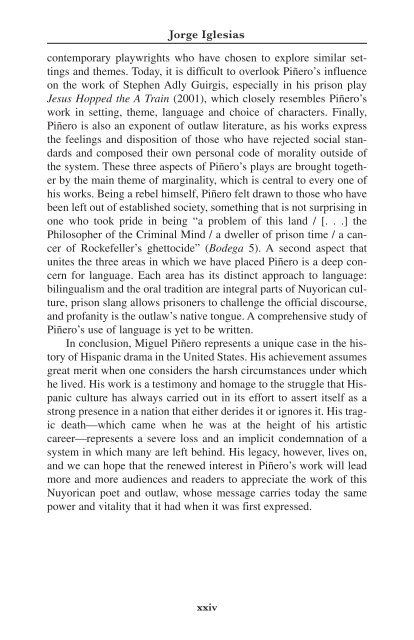Create successful ePaper yourself
Turn your PDF publications into a flip-book with our unique Google optimized e-Paper software.
Jorge Iglesias<br />
contemporary playwrights who have chosen to explore similar settings<br />
and <strong>the</strong>mes. Today, it is difficult to overlook Piñero’s influence<br />
on <strong>the</strong> <strong>work</strong> <strong>of</strong> Stephen Adly Guirgis, especially in his prison play<br />
Jesus Hopped <strong>the</strong> A Train (2001), which closely resembles Piñero’s<br />
<strong>work</strong> in setting, <strong>the</strong>me, language and choice <strong>of</strong> characters. Finally,<br />
Piñero is also an exponent <strong>of</strong> <strong>outlaw</strong> literature, as his <strong>work</strong>s express<br />
<strong>the</strong> feelings and disposition <strong>of</strong> those who have rejected social standards<br />
and composed <strong>the</strong>ir own personal code <strong>of</strong> morality outside <strong>of</strong><br />
<strong>the</strong> system. These three aspects <strong>of</strong> Piñero’s plays are brought toge<strong>the</strong>r<br />
by <strong>the</strong> main <strong>the</strong>me <strong>of</strong> marginality, which is central to every one <strong>of</strong><br />
his <strong>work</strong>s. Being a rebel himself, Piñero felt drawn to those who have<br />
been left out <strong>of</strong> established society, something that is not surprising in<br />
one who took pride in being “a problem <strong>of</strong> this land / [. . .] <strong>the</strong><br />
Philosopher <strong>of</strong> <strong>the</strong> Criminal Mind / a dweller <strong>of</strong> prison time / a cancer<br />
<strong>of</strong> Rockefeller’s ghettocide” (Bodega 5). A second aspect that<br />
unites <strong>the</strong> three areas in which we have placed Piñero is a deep concern<br />
for language. Each area has its distinct approach to language:<br />
bilingualism and <strong>the</strong> oral tradition are integral parts <strong>of</strong> Nuyorican culture,<br />
prison slang allows prisoners to challenge <strong>the</strong> <strong>of</strong>ficial discourse,<br />
and pr<strong>of</strong>anity is <strong>the</strong> <strong>outlaw</strong>’s native tongue. A comprehensive study <strong>of</strong><br />
Piñero’s use <strong>of</strong> language is yet to be written.<br />
In conclusion, Miguel Piñero represents a unique case in <strong>the</strong> history<br />
<strong>of</strong> Hispanic drama in <strong>the</strong> United States. His achievement assumes<br />
great merit when one considers <strong>the</strong> harsh circumstances under which<br />
he lived. His <strong>work</strong> is a testimony and homage to <strong>the</strong> struggle that Hispanic<br />
culture has always carried out in its effort to assert itself as a<br />
strong presence in a nation that ei<strong>the</strong>r derides it or ignores it. His tragic<br />
death—which came when he was at <strong>the</strong> height <strong>of</strong> his artistic<br />
career—represents a severe loss and an implicit condemnation <strong>of</strong> a<br />
system in which many are left behind. His legacy, however, lives on,<br />
and we can hope that <strong>the</strong> renewed interest in Piñero’s <strong>work</strong> will lead<br />
more and more audiences and readers to appreciate <strong>the</strong> <strong>work</strong> <strong>of</strong> this<br />
Nuyorican poet and <strong>outlaw</strong>, whose message carries today <strong>the</strong> same<br />
power and vitality that it had when it was first expressed.<br />
xxiv


